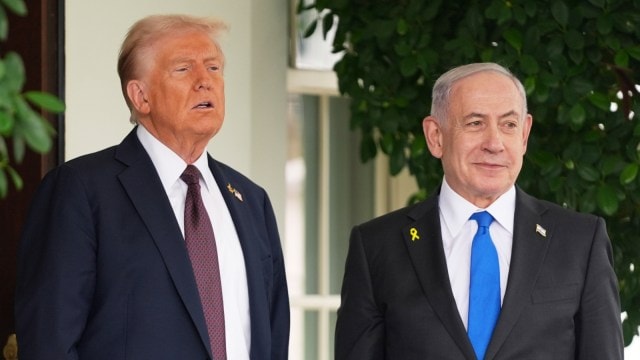
Since the January ceasefire agreement between Israel and Hamas collapsed in less than two months, multiple attempts at mediation to stop the fighting in Gaza have failed. Most recently, Israel’s audacious strikes in Doha, targeting a Hamas negotiation delegation, had ended any realistic prospect of the two-year-long war ending soon. Despite widespread international opposition and mounting domestic anger, Israel launched a ground offensive in Gaza City last month and expanded its assault.
On October 8, however, both sides came to an agreement on the first phase of a ceasefire deal to end the conflict. This comes against the backdrop of US President Donald Trump’s 20-point plan, which is being lauded across the world as a promising step towards a lasting peace in the region. However, given the realities of the past 700-plus days, the road ahead is long and paved with potential disruptions.
Israeli Prime Minister Benjamin Netanyahu has, throughout the war, pandered to his far-right allies, who have kept his government afloat. Coalition partners like Finance Minister Bezalel Smotrich and National Security Minister Itamar Ben-Gvir have already made clear, via multiple statements and interviews, their desire to achieve some very specific war aims: Annexing both Gaza and the West Bank, driving out Palestinians and establishing Jewish settlements. They have also been categorically opposed to any role for the Palestinian Authority in Gaza, and needless to say, any pathway towards Palestinian statehood.
Netanyahu has tried his best to frame the proposal as an Israeli victory, earlier saying that his country’s troops would remain in Gaza even after the hostages are freed, without a proper timeline for withdrawal. His allies are not buying it, though. Ben-Gvir said that his party would not be a part of “a national defeat” and “eternal disgrace”. Smotrich, too, was strongly critical of the condition of halting the IDF’s offensive while details of the Trump plan are worked out. Latest reports indicate that the IDF is preparing to pull back, though the scale of the withdrawal is unknown.
Trump’s plan, therefore, puts Netanyahu in a bind like never before. On the one hand, he can hardly say no to the plan being imposed by Israel’s most important ally and cheered on by most of the world. As reported by Axios, when he told Trump last week that Hamas’s partial acceptance of his plan was nothing to celebrate, the US President hit back, “I don’t know why you’re always so f***ing negative. This is a win. Take it.”
On the other hand, going ahead with the deal puts Netanyahu’s government at risk, and with it, his ability to delay the trials he faces over multiple corruption charges. Not to forget, before the war, Israel saw massive protests against the proposed reform aiming to give the government full control of the Supreme Court or court decisions. An end to the war also means a public reckoning with his own failings with respect to October 7.
Recall that in March, when Israel abandoned the January ceasefire with Hamas, Netanyahu blamed it all on the latter’s refusal to release more hostages before talks on ending the war proceeded, something that was not part of the January agreement. In June, Israel attacked Iran despite the ongoing negotiations between Iran and the US over the future of Tehran’s nuclear programme (reportedly, a deal was close).
And most recently, the September 9 strike on Qatar, targeting Hamas negotiators, was by far Israel’s most stunning disruption. Ironically, it was this attack and the shockwaves it sent across the Arab world that arguably pushed Trump to accelerate plans for peace in Gaza. Reportedly, Trump forced Netanyahu to call up the Qatari Emir and apologise to him.
Cornered, what Netanyahu will do from here is hard to predict. He finds himself trapped between domestic political concerns and geopolitical pressure from Trump, Europe and the Arab states. A possible tactic, then, is to stall and accuse Hamas of not agreeing to the terms of the deal, and convince Trump that he must “finish the job”. The other possibility is that Netanyahu, being adept at keeping his political career alive,
survives the backlash from his far-right allies and weathers the storm till the next election.
The ceasefire and the hostage-prisoner exchange plan, therefore, might still fall apart, and there is enough evidence from this year alone to be cautious about any roadmap until it has been fully implemented. What is reasonably clear is that Netanyahu would invite further global isolation for himself (he took a longer route to the US to bypass arrest in Europe), his government (Smotrich and Ben-Gvir are sanctioned and banned from entering certain countries) and his country, should the war be prolonged and the Palestinian people be forced to endure further misery.
Trump, who has been pursuing the Nobel Peace Prize, will have to keep a check on the Israeli Prime Minister, whose past record does not inspire much confidence. The US President, reportedly, will be flying to Egypt to supervise the final stages of the first phase of the deal and the return of the remaining Israeli hostages. Once they are back in Israel, though, the possibility of Netanyahu reneging on the agreement and renewing hostilities (like in March) cannot be ruled out.
saptarishi.basak@expressindia.com